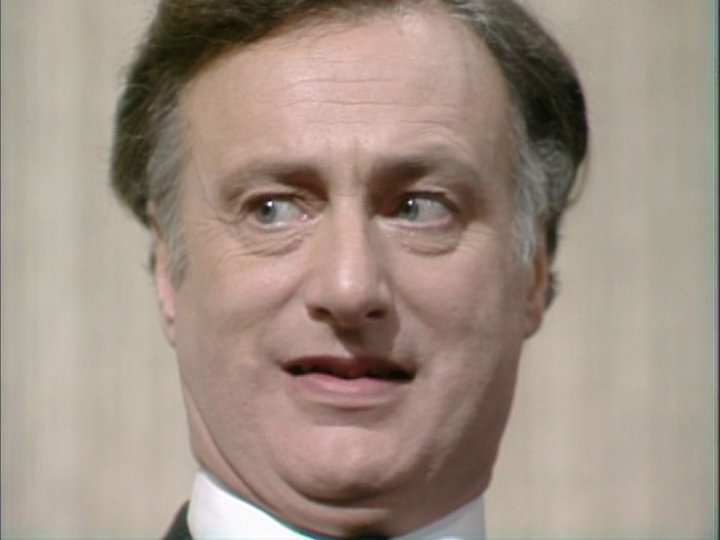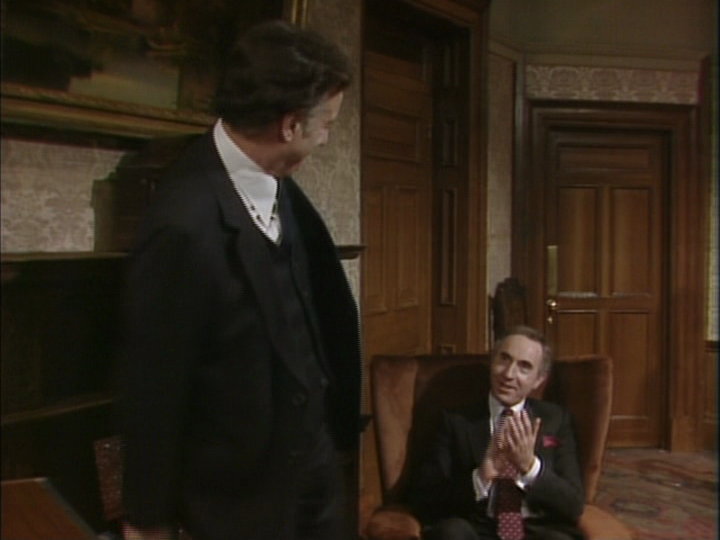Mimsy Review: Yes Minister: The Complete Collection
“Yes, Minister.”
Special features
| Featurettes | 7 |
|---|
If I had to subtitle this eighties political sitcom, I’d call it “Screwtape Politics”.

Jim Hacker is blindsided by the press in the first episode, “Open Government”.
This show was a huge hit in both England and in the United States. Even Americans who don’t follow British television imports will light up and smile on the mention of Yes Minister•. It captures the entrenched bureaucracy that we fear and does so in a way we can laugh at. While Yes Minister shows a very different system of government than we have—the executive and Parliament are not separate, our president does not appoint his cabinet from sitting members of congress, and rarely pulls members of congress out of congress to be part of the cabinet1—the lessons of an entrenched civil service are ones we should take to heart.
Yes Minister is ostensibly about Member of Parliament Jim Hacker, who in episode one has just won reelection to Parliament in Birmingham East and is chosen as a cabinet minister. But the series appears to me to be almost as much about Bernard Woolley. It’s a sort of political Screwtape Letters•, with long-term civil servant Sir Humphrey Appleby vying with Hacker for Woolley’s soul. This leads up to the penultimate episode, where Jim Hacker is faced with a real moral dilemma, one which also draws in Woolley. Throughout the show, half the characters accuse the other half of being Humphrey Appleby. Which is the point of the show: that everyone in politics becomes Humphrey Appleby if they survive. There may be little victories along the way, but politicians who stay in politics enjoy the protection—the plausible deniability—that a thick bureaucracy gives them.
The very last show has Hacker realizing that he has forgotten his constituents—after they very blatantly tell him. He endeavors to assist them, and, of course, that has to end up a rung in his ladder to Appleby, too. It isn’t just that a long-term bureaucracy exists to impede changes, but that a long-term bureaucracy exists to divert political attention—money and power—to benefit the members of the long-term bureaucracy. It isn’t what the government can give to the people, but what the people can give to the government. Hacker doesn’t understand this, and in many shows tries to change it. He comes into power as a reformer, and his first inclination is usually to do the right thing. But without experience or willpower, he’s easily persuaded not to do wrong, but to pretend that right is wrong and wrong is right.

Sir Humphrey Appleby congratulates Hacker for talking like Humphrey Appleby.
Which is not to say that Jim Hacker is always on the side of the Angels. In one episode he doctors a report on the safety of a chemical so that it changes, basically, from “harmless” to “mostly harmless”, and on the strength of that caveat denies a new manufacturing plant and all the jobs and health care benefits it entails. In the context of the television show, the only danger of the fictional metadioxin is that it was politically dangerous: it was an inert form of dioxin that had been shown not to react with anything or cause any health problems. But dioxin had recently been involved in a catastrophe, so any form of it, no matter how safe, was politically dangerous. In this show, Hacker has to fight the civil service in order to do the wrong thing.
Jim Hacker is very politically astute, but also very psychologically insecure, which makes him a lot like a lot of very successful politicians today. It also makes him (just as it makes our politicians) a very easy mark for the press and the civil service.2
The script seems very sympathetic to conservative reforms; while conservative reforms almost always lose by the end of the show, they lose because of entrenched government bureaucracy, and the arguments in favor of them losing are always ridiculously silly. The show came out during the Thatcher years, and is seen somewhat as a reflection of it, but the writers say in an interview on the DVD that they originally had it ready in 1978; the BBC delayed it until after the election, because they didn’t want to run a political sitcom during a period when it ran the risk of being relevant. That decision itself seems to deserve the Appleby treatment.
Yes Minister apparently was the favorite TV show of Prime Minister Thatcher; she even did a sketch with Nigel Hawthorne (Humphrey Appleby) and Paul Eddington (Jim Hacker) during an awards ceremony in 1984. I haven’t been able to find the full sketch, but there are bits of it in an interview she did with Neil Kinnock. Of course, she’d like to think she would win in a verbal minuet against Humphrey Appleby, and perhaps she did in the short term, but Great Britain quickly reverted to bureaucracy after the Thatcher years.
The writers claim to have interviewed people within the civil service to get some of their great stories, including smuggling liquor into a strict Islamic celebration. While it’s satire, and satirical in the sense that it takes reality and amplifies it, the show definitely looks like it could result in the actual policy that we see from politicians.
Ultimately, Yes Minister• makes me very sympathetic to the case for civil servants resigning after every election. It’s both very funny and very frightening at the same time. And well worth watching, just for the long-winded non-statements from Appleby. The monologue in the Thatcher interview is a great example: clearly, it’s “a load of meaningless drivel”. But is it?
This complete collection• includes all three seasons of Yes Minister, but not the two later seasons of Yes, Prime Minister•. It’s well worth watching.
For one thing, unless it’s done in a very safe district this runs the risk of losing a vote in the Senate or the House, since that representative will have to be replaced.
↑As I write this, it’s coming out that Supreme Court Justice John Roberts may have changed his vote on the health insurance takeover not because of constitutional concerns but because he wanted to be thought better of by his DC colleagues. With the very Yes Minister-like result that the same justice wrote both the concurring and dissenting opinions on the case.
↑
| Actors | Paul Eddington, Nigel Hawthorne, Derek Fowlds |
|---|---|
| Length | 10 hours, 13 minutes |
| Spoken language | English |
| Subtitles | None |
| Special Feature | Featurettes |
| More links |
- Cabinet of the United Kingdom at Wikipedia
- “Ministers of the Crown, and especially Cabinet Ministers, are selected primarily from the elected members of House of Commons, and also from the House of Lords, by the Prime Minister. Cabinet Ministers are heads of government departments.”
- Margaret Thatcher talks about Yes Minister
- “Caricatures succeed because there’s a grain of truth in them.”
- The Screwtape Letters•
- From doing the right thing, to the dangers of government education, this may be C.S. Lewis’s most brilliant work.
- Yes Minister
- “James Hacker is the British Minister for Administrative Affairs. He tries to do something and cut government waste, but he is continually held back by the smart and wily Permanent Secretary of the Department, Sir Humphrey Appleby. Private secretary Bernard Woolley is caught in the middle, between his political master, and his civil service boss.”
- Yes Minister: The Complete Collection• (DVD)
- A British television show about one Member of Parliament who moves into the Prime Minister’s cabinet on an “open government” platform. He quickly runs heads-up against the entrenched civil service.
- Yes, Prime Minister: The Complete Collection• (DVD)
- Jim Hacker ascends to Number 10. He even thinks he might be allowed to govern Britain.
- Paul Eddington at Wikipedia
- “Paul Eddington, CBE (18 June 1927 - 4 November 1995) was an English actor best known for his appearances in popular television sitcoms of the 1970s and 80s: The Good Life, Yes Minister and Yes, Prime Minister.”
- Nigel Hawthorne at Wikipedia
- “Sir Nigel Barnard Hawthorne, CBE (5 April 1929 – 26 December 2001) was an English actor, perhaps best remembered for his role as Sir Humphrey Appleby, the Permanent Secretary in the 1980s sitcom Yes Minister and the Cabinet Secretary in its sequel, Yes, Prime Minister.”
- Derek Fowlds at Wikipedia
- “Derek Fowlds (born 2 September 1937) is an English actor, known for playing Bernard Woolley in popular British television comedies Yes, Minister and Yes, Prime Minister and Oscar Blaketon in the long-running ITV police drama Heartbeat.”
